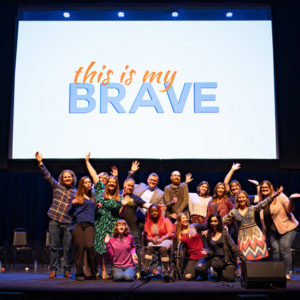My Annoying Sidekick: A guest post by Jessica

It’s a phase. It’s just a phase. I’ll grow out of it.
13 years later, I still have not grown out of it. As a 25-year old female, I have now officially been pulling out my hair for over half of my life.
It started as a preteen, I would pull it strand by strand, examine the texture, the cold, wet root. I would hide it, camouflage it into places I knew no one would look: underneath couches, on dark carpets, between the pages of textbooks. No one saw the remnants and it was my “hairy” secret. The center part on my scalp grew to the width of my index finger and I didn’t wear my hair down for the next two years. Friends and teachers didn’t say anything, neither did my parents. If they saw me pulling, they probably were in shock of my strange behavior and at a loss for words.
In college I became curious about Trichotillomania. The first time I typed “I pull out my own hair” into the Google search bar in 2008, an alternate universe was revealed: definitions, anecdotes, resources, websites devoted to others with similar disorders. My mind was blown and I finally realized I was not alone.
So what was I doing to myself? It’s called Trichotillomania, or “trich” for short, and is an impulse control disorder characterized by the compulsive urge to pull out one’s hair. It falls under the Body Focused Repetitive Behavior classification in the DSM V and it is estimated that Trich affects 2-4% of the general population. Treatment is available, but there is no cure.
Over the years, I continued to tell myself that my Trich was just a bad habit, that one day I would be able to go cold turkey and just give up pulling. If only it were that easy. Upon entering graduate school and various internships, my pulling increased and I recognized that being in professional setting was not conducive to overcoming the disorder. It was that moment when I realized that my Trich was real and not something I could fight myself. I sought help from a wonderful therapist in the counseling center of my graduate school and learned that asking for help doesn’t make you weak, it makes you stronger. Her specialty was anxiety but she had never worked with anyone a Body Focused Repetitive Behavior before: I was her introduction to the world of Trich. We brainstormed ways to cut back on pulling and various methods of limiting urges. At this point, I feel that I have tried every tool to manage the pulling: gloves, hats, bandaids, wet hair, fancy hair, fidget toys, rubber bands, rubber fingers, silly putty, bracelets, and yet I am still surprised when I hear of other methods that have worked for people. I ended up transferring therapists to a specialist at a Trichotillomania Clinic and have been lucky enough to continue working on understanding how to best treat and manage my disorder.
After some amount of convincing, I forced myself to attend a support group meeting in Boston. As an individual with social anxiety, it was among the most nerve wracking and terrifying things I have ever pushed myself to do: Tell my story to a bunch of random strangers? Are you nuts?! It ended up being among the best decisions I have ever made and was the first time I had ever opened up to anyone (other than two close friends) about my struggles. And let me tell you, it was incredibly liberating to see and hear other individuals who were so relatable. “You primarily pull in the car? Me too!” “You like the feel of the root against your lips? OMG same!” After my first meeting, I miraculously went on a 10-day pull-free streak: the longest of my life.
Acceptance is and remains tough for me. How can I accept something that I so desperately want to eliminate from my life? And sure, I have awesome days where urges are non-existent. But there are other days where my hands and fingers feel like a separate entity from my body that I have absolutely no control over, like a magnetic force is driving them to my scalp. “Just stop,” I tell myself, “you’re doing this to yourself!” I try to stop, I want to stop, but I cannot stop pulling out my hair. In fact, some days I actually don’t want to stop pulling, it just feels so good. But those days pass and I have learned that Trich is something that does not just go away by closing my eyes and counting to three. It is with me for life, an annoying sidekick, and it is up to me to accept it for what it is and learn to work with it so I can continue to live my life to the fullest. And as it turns out, I have written this brief article with Bandaids on my thumbs and a few close calls.
I know my story is not unique and Trich remains one of my biggest secrets. Every day is a new battle, but a battle that I am ready for and know I have to face head on.
*****
 Originally from the San Francisco Bay Area, Jessica Schulman has been living in Boston for 7 years. She graduated with a BA from Brandeis University and recently received her M.Ed. in Higher Education Administration from Suffolk University. She currently works as an Admissions Counselor at a Boston-area college. Jessica is passionate about soccer, travel, and puns and will be running her first half-marathon this month!
Originally from the San Francisco Bay Area, Jessica Schulman has been living in Boston for 7 years. She graduated with a BA from Brandeis University and recently received her M.Ed. in Higher Education Administration from Suffolk University. She currently works as an Admissions Counselor at a Boston-area college. Jessica is passionate about soccer, travel, and puns and will be running her first half-marathon this month!
You can follow Jessica on Twitter: @schulman_jess

